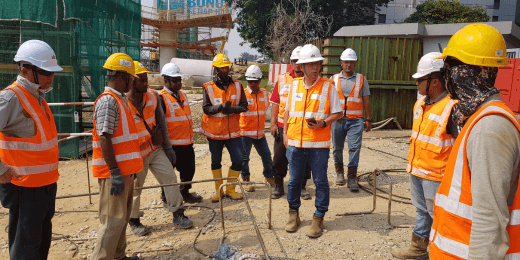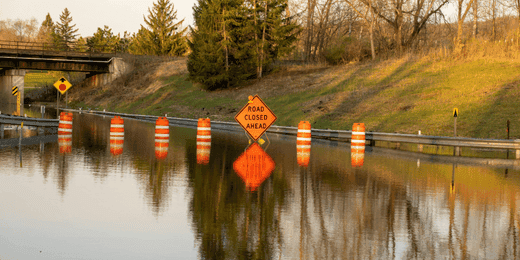A Guide to Pre Construction Meetings
Learn why these meetings are crucial in a construction project and how to conduct them effectively.

Published 4 Oct 2024
Article by
6 min read
What is a Pre Construction Meeting?
A preconstruction meeting occurs before the construction work starts on a project. Its goal is to set the foundation for a smooth construction process by discussing and aligning the project scope, timelines, roles, responsibilities, and safety protocols and address any potential challenges that may arise during construction.
Why are Pre Construction Meetings Important?
Preconstruction meetings are vital for the success of any construction project. Here are some of the reasons why you should conduct them:
Project Alignment : The meeting ensures that all stakeholders, including architects, contractors, and clients, are on the same page regarding project goals, timelines, and expectations. This alignment helps prevent misunderstandings later on.
Risk Management : Discuss potential challenges and risks upfront to identify issues before construction begins and develop mitigation strategies to save time and resources.
Budget Clarity : Preconstruction meetings provide an opportunity to review the project budget in detail. It ensures that everyone understands the financial aspects, helping avoid overspending and allocating funds appropriately.
Communication Channels : Establishing clear communication channels during these meetings is vital. It sets the tone for collaboration throughout the project, making it easier to address concerns and share updates as construction progresses.
Chain of Command: The preconstruction meeting should clarify who is in charge and the reporting structure. This helps prevent communication breakdowns during the project.
Streamline Your Construction Operations
Unlock the power of data-driven insights, standardized processes, and effective communication to improve efficiency and productivity across all jobsites.
People Involved in the Meeting
The project manager or general contractor usually leads a preconstruction meeting. Their role is to ensure everyone involved in the construction project is on the same page before work starts. They also set the agenda and guide discussions during the meeting.
Aside from the project manager and general contractor, other key stakeholders should attend preconstruction meetings. These may include:
Architects : To discuss design plans and ensure they meet client expectations.
Engineers : To assess the feasibility of designs and address any technical issues.
Contractors/ Subcontractors : To review construction plans and timelines.
Clients/Developers : To clarify project goals and expectations.
Safety Officers : To discuss safety protocols for the construction site.
Homeowners/Building owners: To provide input and discuss any concerns.
Agenda of the Meeting
The agenda for a pre-construction meeting can vary depending on the project, but it generally includes the following topics:
Review of Site and Structure
Site preparation includes thoroughly reviewing the site and structural plans to help ensure everyone understands the project scope and design. It includes reviewing the site layout, location of utilities, and any potential obstacles or hazards.
Overview of Plans and Specifications
This section involves a detailed review of the project plans and specifications, including materials, finishes, and special requirements. It ensures everyone involved in the project understands what is expected and helps identify discrepancies or potential issues.
Selection and Change Guidelines
The team discusses any planned changes and how they will be managed. This includes change order procedures, potential impacts on timelines and costs, and the approval process for changes.
Policies and Procedures
Setting policies and procedures for the construction project is crucial to ensure smooth operations. This section may include discussing safety protocols, communication channels, and expectations for quality control.
How to Prepare for a Pre Construction Meeting
It is essential to prepare adequately to ensure a successful preconstruction meeting. Here are some tips to consider:
Prepare Questions Before the Meeting
Write down critical questions and concerns beforehand to ensure key persons address them during the meeting. It can help keep discussions focused and prevent important points from being overlooked. Some examples of questions to ask may include:
What are the project goals and timeline?
What are the key milestones for the project?
Who is responsible for coordinating different aspects of the project?
Are there any potential challenges that need to be addressed?
Is the budget still on track?
Gather All Important Construction Documents
It’s essential to have all necessary documents ready for a preconstruction meeting. These documents can be sent electronically ahead of time based on the builder’s or client’s preference, but it’s still a good idea to bring them to the meeting for quick reference if needed. Some important documents to have on hand include:
Project plans and specifications
Building material cost estimates
Site safety plans
Building permits
Finalize All Visual Aids
Visual aids, such as drawings or 3D models, can help explain design plans and any changes made. These visual aids complement the information in your documentation and help the team generate more specific questions.
Share the Agenda Before the Meeting
Sharing the pre-construction meeting agenda ahead of time allows everyone to prepare and come to the meeting with a clear understanding of what will be discussed. It can also help prevent any last-minute changes or misunderstandings.
How to Conduct a Pre Construction Meeting
When running a preconstruction meeting, following a few steps is essential to ensure you achieve all the meeting’s goals. These steps include:
Go Over All Important Documents and Contracts: Start the meeting by reviewing all critical documents and contracts. This includes project plans , specifications, safety protocols, and approved change orders.
Review Payments, Safety Plans, and Inspection Plans: Discuss payment schedules, safety plans, and inspection plans to ensure everyone understands their responsibility. It is also the time to address any questions or concerns related to these topics.
Clarify Roles and Project Schedule: Clarify everyone’s roles and responsibilities, including subcontractors or third-party vendors. This ensures everyone is on the same page regarding who is responsible for which tasks. Review the project schedule and deadlines to ensure everyone understands their timelines.
Identify and Mitigate Potential Risks: Encourage open communication during the meeting to identify potential risks and challenges that may arise during the project. Addressing these issues early on is essential to preventing delays or cost overruns.
Establish Communication Channels: Set clear communication channels between all stakeholders involved in the construction project. This can include daily check-ins, weekly progress meetings, or a designated point of contact for questions or concerns.
Review the Design: The pre-construction meeting is a great chance to go over the building design room by room or area by area.
Discuss Potential Issues and Resolutions: Take the time to discuss any potential issues or challenges that may arise during construction and how they will be addressed. It will help avoid surprises down the road.
Open the Floor for Questions and Concerns: Allow everyone to ask questions or raise any concerns they may have. This will allow everyone to clarify anything discussed and help ensure everyone is on the same page.
Walk the Project Site or Lot as a Group: Reviewing construction project documents is one thing, but visiting the site in person is another. It allows everyone to see the location and discuss concerns or potential challenges.
Ensure Smooth Pre Construction Meetings with SafetyCulture
Why Use SafetyCulture?
SafetyCulture is a mobile-first operations platform adopted across industries such as manufacturing, mining, construction, retail, and hospitality. It’s designed to equip leaders and working teams with the knowledge and tools to do their best work—to the safest and highest standard.
Streamline processes, eliminate bottlenecks, enhance resource utilization, and build an agile and scalable infrastructure with SafetyCulture. Strive for operational excellence to boost competitive advantage, foster sustainable growth, and deliver long-term value.
✓ Save time and reduce costs✓ Stay on top of risks and incidents✓ Boost productivity and efficiency✓ Enhance communication and collaboration✓ Discover improvement opportunities✓ Make data-driven business decisions
Related articles
Environmental Safety
Safety

Oil Drum Storage: Safety Guide and Best Practices
Learn the practices for safe oil drum storage, its importance, and the regulations for compliance.
Environmental Safety
Safety

Flood Risk Management
Read this guide to flood risk management, its importance, and the key components and strategies for this process.
Environmental Safety
Safety

A Comprehensive Guide to Stormwater Pollution Prevention Best Management Practices (SWPPP BMP)
Learn about the types of best management practices for SWPP and the steps to effectively implement them in prevention plans.